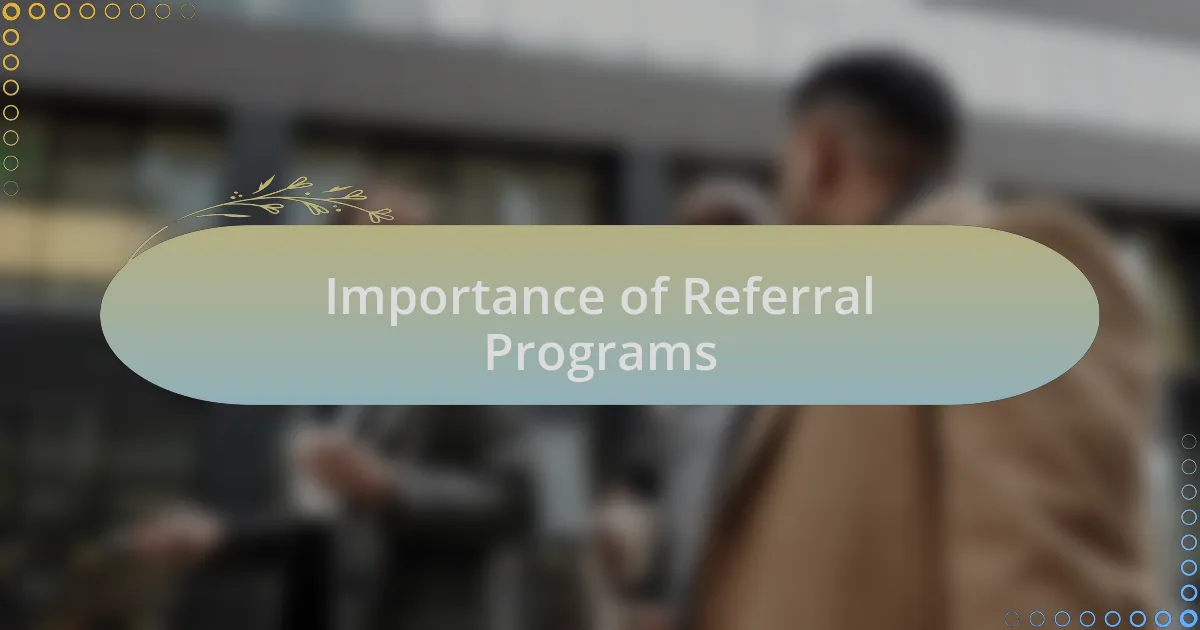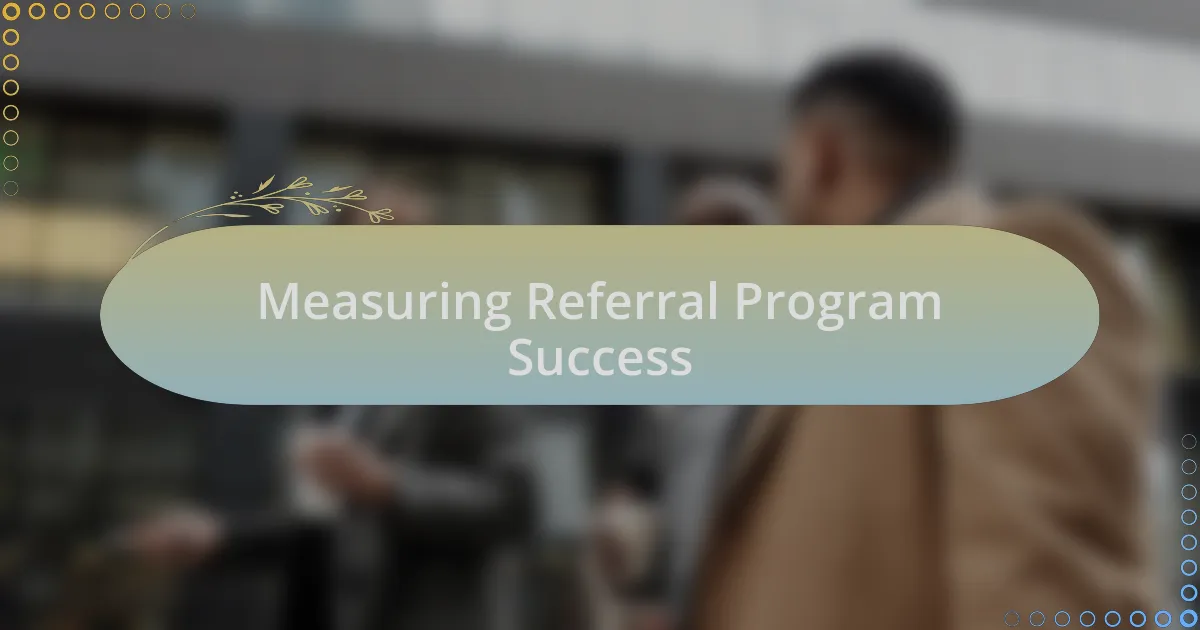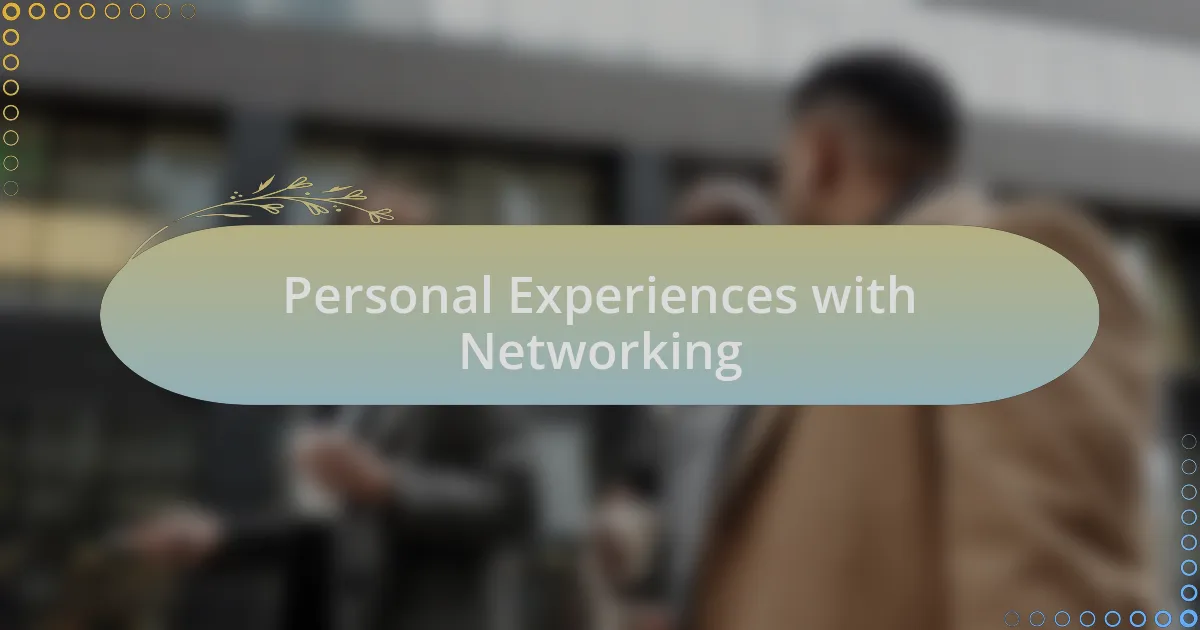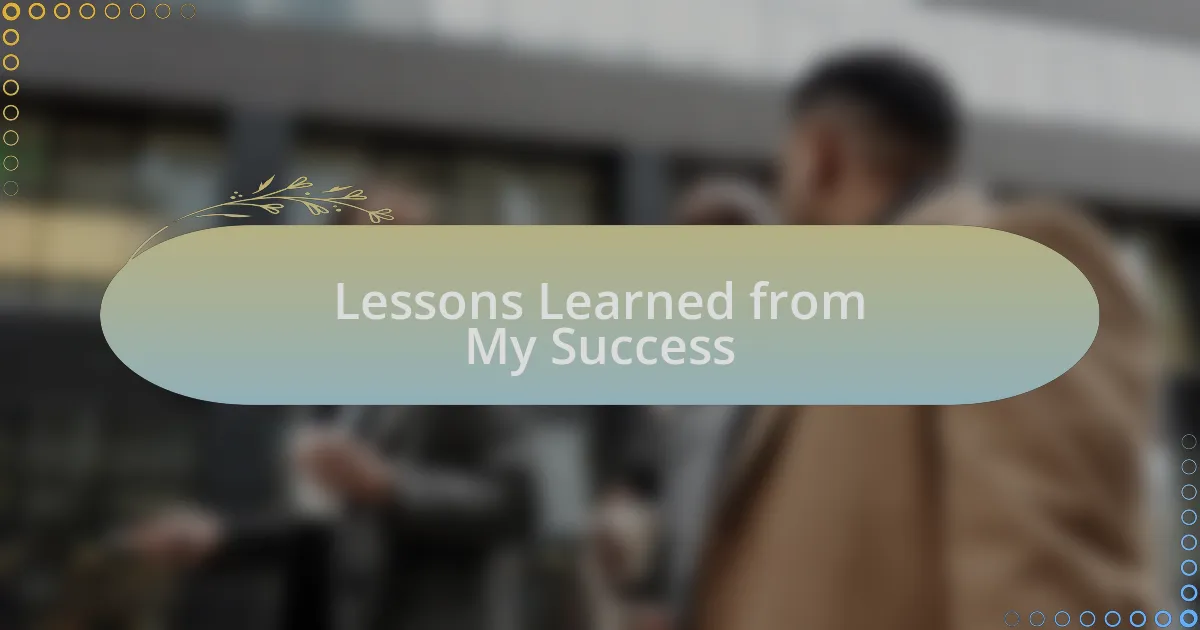Key takeaways:
- Local business networking involves building genuine relationships, which can lead to unexpected opportunities and collaborations.
- Referral programs are essential for customer loyalty, higher conversion rates, and enhancing community engagement among local businesses.
- Effective networking requires follow-up, active listening, and sharing valuable insights to strengthen connections and foster referrals.
- Measuring referral program success involves tracking metrics, assessing the quality of referrals, and gathering feedback to improve processes and relationships.

Understanding Local Business Networking
Local business networking is much more than just exchanging business cards; it’s about building genuine relationships. I remember attending a local business mixer where I struck up a conversation with a bakery owner. That one connection led to a fruitful collaboration, showcasing how these networks can create unexpected opportunities.
Have you ever considered how a simple cup of coffee can lead to strategic partnerships? I’ve experienced it firsthand by meeting local business owners over casual meet-ups. Those informal settings often spark innovative ideas that wouldn’t surface in a more formal environment. It’s fascinating how sharing experiences can deepen connections and foster trust within the community.
In a way, local business networking serves as a support system. I often find solace in knowing there are others facing similar challenges. When I share my experiences, not only do I gain insights, but I also encourage others to open up about their journeys. This mutual exchange creates an atmosphere of collaboration that is essential for growth in our local economy.

Importance of Referral Programs
When I think about why referral programs matter, I recall my own experience when I referred a friend to a local plumbing service. Not only did my friend get excellent service, but the plumber also sent me a thank-you note and a discount on my next job. That small act of appreciation made me feel valued and more inclined to refer others. It’s that kind of personal touch that builds loyalty and trust, vital components in any business relationship.
Referral programs are essential because they often result in higher conversion rates. I’ve seen this firsthand when I started offering incentives for referrals in my own business. People were more likely to not just refer, but to refer qualified leads, which made my customer acquisition process smoother and more efficient. Isn’t it incredible how someone else’s positive experience can transform into a new opportunity for growth?
Furthermore, I can’t stress enough how referral programs can enhance community engagement. When local businesses support one another personally, it fosters a sense of belonging. I remember the buzz at a networking event where everyone shared their success stories through referrals. It was inspiring to see how interconnected we all are. Doesn’t it make you think about the power of community in driving success?

Strategies for Effective Networking
Building strong and meaningful relationships is at the heart of effective networking. In my early days of networking, I realized that attending events was just the beginning. I began following up with people I met, whether through a quick email or a coffee chat. This simple strategy transformed acquaintances into genuine connections, leading to referrals I never expected. Wouldn’t you agree that if people feel they matter to you, they are more likely to support your business?
Being present and engaged during conversations is another critical strategy I’ve honed over time. I remember a local business mixer where I focused on listening intently. Instead of waiting for my turn to speak, I absorbed what others shared. That approach not only allowed me to identify how I could help them but also built a rapport that resulted in fruitful referrals down the line. Isn’t it fascinating how mutual understanding can spark authenticity in relationships?
Lastly, I’ve found that being resourceful and sharing valuable insights can set you apart in networking situations. Once, I posted a simple tip about local marketing on social media, and it unexpectedly resonated with my network. People began reaching out for advice, which opened up discussions about potential collaborations and referrals. Isn’t it amazing how contributing to others’ success often circles back to our own?

Measuring Referral Program Success
To gauge the success of my referral program, I focused on tracking key metrics like the number of referrals generated and the conversion rates of those leads. I vividly remember the moment when I saw a spike in new clients after implementing a simple feedback survey for those who referred others. It became clear that not only were people sending referrals, but they were also excited to share their positive experiences. Have you ever noticed how a little encouragement can inspire your network to take action?
Another essential aspect of measuring success is understanding the quality of referrals. Early on, I learned that counting referrals isn’t enough; I needed to assess their fit with my business. I recall a time when a referral brought in a client who ultimately wasn’t aligned with my services. It taught me to define what a “good fit” means for my business and to communicate that with my network. How vital is it to ensure that the referrals you receive can genuinely grow your business?
Finally, I found it invaluable to ask for feedback from those who participated in my referral program. By reaching out after a referral, I could uncover what motivated them to recommend my services and how their experience could be improved. This practice not only helped me refine my approach but also made my referrers feel valued and appreciated. Isn’t it rewarding to create a cycle of connection and improvement that benefits everyone involved?

Personal Experiences with Networking
Networking has always been a double-edged sword for me. I remember attending my first local business mixer, feeling both excitement and anxiety. There I was, clutching my business cards, debating whether to push myself forward or hang back and observe. Yet, when I finally introduced myself to someone—and they reciprocated with genuine interest—I felt a rush of validation. That initial connection blossomed into a fruitful partnership, showing me how stepping out of my comfort zone can lead to unexpected opportunities.
One poignant experience that stands out is when a fellow entrepreneur approached me, thanking me for the referrals I’d provided. I hadn’t realized how impactful those simple gestures had been for her business. Her appreciation ignited a sense of community I hadn’t felt before. Have you ever received unexpected gratitude that made you rethink how you contribute to your network? It dawned on me that every referral wasn’t just a business transaction; it was an investment in mutual success.
I learned the hard way that not every networking event leads to fruitful connections. One time, I left a seminar feeling disheartened after engaging with several individuals who seemed more interested in collecting business cards than forging genuine relationships. It reminded me of the importance of quality over quantity. It’s crucial to recognize that true networking isn’t just about meeting as many people as possible; it’s about building lasting relationships that support and uplift each other. How often do we focus on making a connection rather than just expanding our contact list?

Lessons Learned from My Success
In my journey of building a successful referral program, one key lesson emerged: the importance of nurturing relationships. Early on, I discovered that simply gathering contacts wasn’t enough. During one networking event, I followed up with a connection I had met several months prior. To my surprise, not only did they remember our conversation, but they also expressed how they had been waiting for an opportunity to collaborate. It reinforced my belief that genuine follow-ups can transform acquaintances into advocates.
Another insight was the value of a well-defined referral process. Initially, I stumbled through it, relying on verbal agreements and vague expectations. After experiencing a miscommunication that caused frustration for both parties, I realized the necessity of clear guidelines. From that point on, I crafted simple, straightforward materials outlining how referrals worked. Have you ever had a situation where lack of clarity led to missed opportunities? For me, it highlighted that setting clear parameters can pave the way for smoother interactions and success.
Finally, embracing feedback has been a game changer. At one point, I sent out a survey to my referral partners, asking for their thoughts on how the program could be improved. The responses were both enlightening and humbling, revealing areas I hadn’t even considered. This openness to critique not only strengthened my program but also deepened the trust among my network. Isn’t it fascinating how constructive criticism can be a catalyst for growth? It reminds me that every opinion is a potential treasure trove of insights waiting to be uncovered.